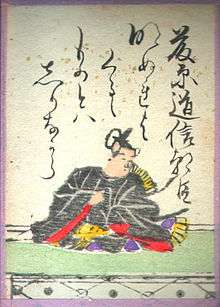Fujiwara no Michinobu

Fujiwara no Michinobu, from the Ogura Hyakunin Isshu.
Fujiwara no Michinobu (藤原道信, 972–994) was a Japanese waka poet of the mid-Heian period. One of his poems was included in the Ogura Hyakunin Isshu. He produced a private waka collection, the Michinobu-shū.
Biography

Katsushika Hokusai, The Poem of Fujiwara no Michinobu Ason, 1839, Princeton University Art Museum, depicting the poem transcribed in the cartouche at upper right:
Though I know full well
That the night will come again,
E'en when day has dawned;
Yet, in truth, I hate the sight,
Of the morning's coming light.
Though I know full well
That the night will come again,
E'en when day has dawned;
Yet, in truth, I hate the sight,
Of the morning's coming light.
Born in 972, he was a son of Tamemitsu and adopted by the latter's brother Kaneie.[1][2]
He served as commander of the guard, and although he died young he was considered a brilliant commander.[1] He died in 994.[1][2]
Poetry
Forty-eight of his poems were included in imperial anthologies, and he was listed as one of the Late Classical Thirty-Six Immortals of Poetry.[1][2]
The following poem by him was included as No. 52 in Fujiwara no Teika's Ogura Hyakunin Isshu:
| Japanese text[3] | Romanized Japanese[4] | English translation[5] |
|
|
|
A private collection of his poems, the Michinobu-shū (道信集), survives.[1][2]
References
Bibliography
- Keene, Donald (1999). A History of Japanese Literature, Vol. 1: Seeds in the Heart — Japanese Literature from Earliest Times to the Late Sixteenth Century. New York: Columbia University Press. ISBN 978-0-231-11441-7.
- McMillan, Peter. 2010 (1st ed. 2008). One Hundred Poets, One Poem Each. New York: Columbia University Press.
- Suzuki Hideo, Yamaguchi Shin'ichi, Yoda Yasushi. 2009 (1st ed. 1997). Genshoku: Ogura Hyakunin Isshu. Tokyo: Bun'eidō.
External links
- List of Michinobu's poems in the International Research Center for Japanese Studies's online waka database.
- Fujiwara no Michinobu on Kotobank.
This article is issued from
Wikipedia.
The text is licensed under Creative Commons - Attribution - Sharealike.
Additional terms may apply for the media files.